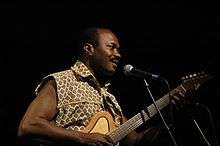Félix Manuaku Waku
| Félix Manuaku Waku | |
|---|---|
 Félix Manuaku Waku performing | |
| Background information | |
| Also known as | Pépé Fely; Pépé Felly |
| Born | August 19, 1954 |
| Origin | Kinshasa |
| Genres | Soukous, Rhumba, Cavacha |
| Occupation(s) | Musician |
| Instruments | Guitar |
| Associated acts | Zaiko Langa Langa, Grand Zaiko Wawa |
Félix Manuaku Waku, also known as Pépé Fely (or Felly)[1] is a soukous guitarist from the Democratic Republic of Congo. He has been described as the foremost Congolese solo guitarist of his generation,[2] and is credited with establishing the guitar as the lead instrument in contemporary Congolese music.[3]
A graduate of the Kinshasa Academie des Beaux Arts,[4] he was one of the founders of the popular Congolese musical group Zaiko Langa Langa,[5] and his rapid guitar-playing style[6] was a distinctive feature of the group's music.[7] In Zaiko Langa Langa he attracted critical praise for his ability to play continuously without a break, and earned the sobriquet "the hardest left hand in Zaire".[8] He was noted also for his mastery of the sebene technique.[9]
He left Zaiko Langa Langa in 1979 to found another group, the award winning[10] Grand Zaiko Wawa,[11][12] which in turn cultivated a new generation of prominent Congolese musicians.[13]
Manuaku Waku now lives in Lausanne, Switzerland, where he has formed a new group named African Mambo.[9]
References
- ↑ "Bimi Ombale, "si Jossart l'avait vraiment voulu, il m aurait retenu à ses côtés"" (in French). Angola Presse. 10 September 2010.
- ↑ Chebwa, Manda (1996). Terre de la chanson: la musique zaïroise, hier et aujourd'hui (in French). De Boeck Universite. p. 166. ISBN 2-8011-1128-7.
- ↑ Graham, Ronnie (1988). The Da Capo guide to contemporary African music. Da Capo. p. 205. ISBN 0-306-80325-9.
Manuaku had redefined the role of the lead guitar as the lead instrument in modern Congo music
- ↑ Enyimo, Martin (31 October 2009). "Pépé Felly Manuaku Waku revient sur scène à Kinshasa" (in French). Le Potentiel.
- ↑ Eyre, Banning (2002). Guitar Atlas Africa: Your Passport to a New World of Music. Alfred Music Publishing. p. 12. ISBN 0-7390-2474-4.
- ↑ Coelho, Victor (2003). The Cambridge companion to the guitar. Cambridge Companions to Music. Cambridge University Press. p. 58. ISBN 0-521-00040-8.
- ↑ Stewart, Gary (2004). Rumba on the river: a history of the popular music of the two Congos. Verso. p. 213. ISBN 1-85984-368-9.
- ↑ Stapleton, Chris; Chris May (1987). African all-stars: the pop music of a continent. Quartet. p. 153. ISBN 0-7043-2504-7.
- 1 2 Muanza, Jossart (25 February 2005). "Manuaku Waku "Pépé Felly" fait à nouveau parler de lui". Afrique Echos Magazine. Archived from the original on 2011-07-26.
- ↑ Larkin, Colin (1992). The Guinness encyclopedia of popular music. 4. Guinness Publishing. p. 2767. ISBN 1-882267-04-4.
They were voted best orchestra in 1984
- ↑ "Manuaku Waku "Pépé Felly" fait à nouveau parler de lui" (in French). Afriquechos. 25 February 2005. Archived from the original on 2011-07-26.
- ↑ White, Bob (2008). Rumba rules: the politics of dance music in Mobutu's Zaire. Duke University Press. pp. 214–5. ISBN 0-8223-4112-3.
- ↑ Graham, Ronnie (1992). The world of African music. Pluto. p. 118. ISBN 0-7453-0657-8.